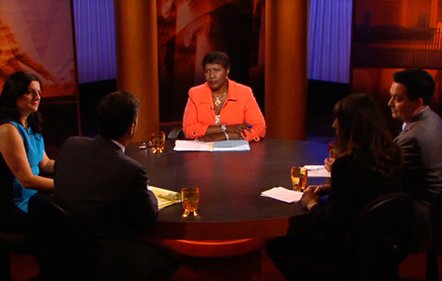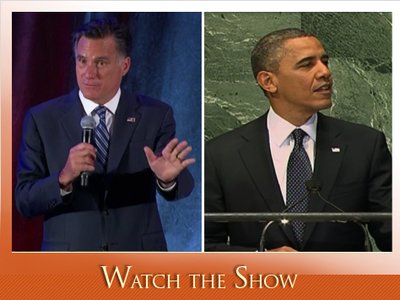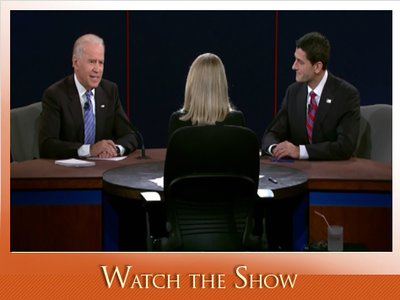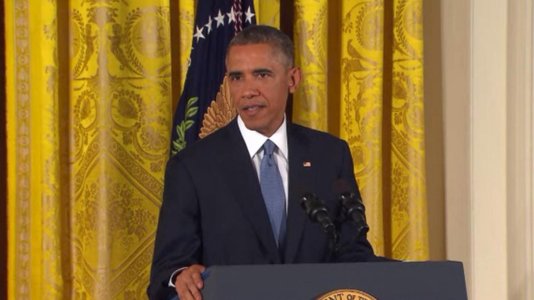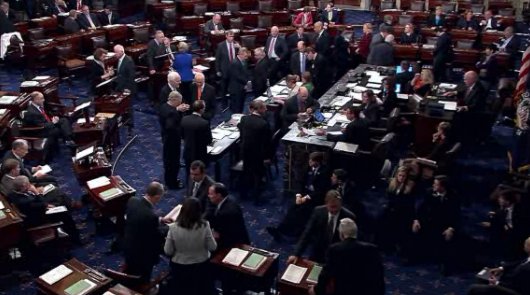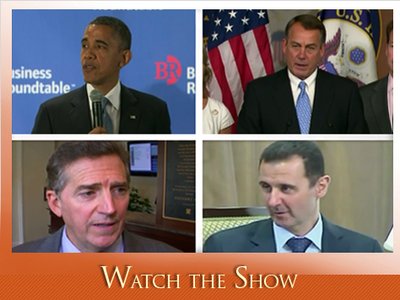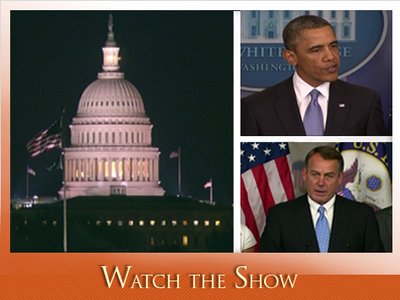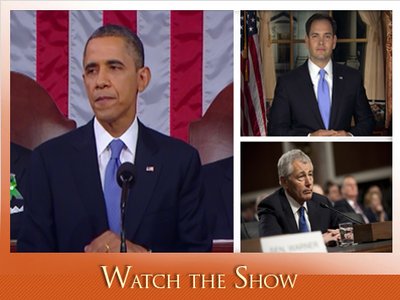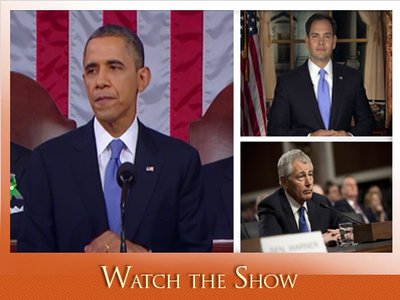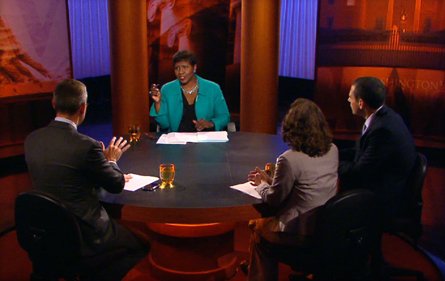Republicans and Democrats unveiled their budget proposals this week, and President Obama travelled to Capitol Hill to broker a bipartisan deal. Meanwhile, Republicans met for the annual Conservative Political Action Conference where rising GOP stars rallied activists. Joining Gwen: John Dickerson, Slate and CBS News; Amy Walter, Cook Political Report; and Jeanne Cummings, Bloomberg.
GWEN IFILL: Reaching out, reaching in – how the two major parties are adjusting to new realities, tonight, on “Washington Week.”
PRESIDENT BARACK OBAMA: (From tape.) I think there’s a genuine desire on the part of Republicans and Democrats to try to get something done.
REPRESENTATIVE McMORRIS ROGERS (R-WA) : (From tape.) The Senate is working on their budget. The House is working on our budget. The president and the House Republicans are meeting. I think this is all progress in the right direction.
MS. IFILL: Republicans and Democrats did something unusual this week on Capitol Hill: they talked.
SENATOR MITCH MCCONNELL (R-KY) [Senate Minority Leader]: (From tape.) With regard to what a lot of you have described as the president’s charm offensive, we welcome it.
MS. IFILL: Over lobster lunches and mostly cordial discussion, “bipartisanship” was the watch word. But big differences remain –
REPRESENTATIVE PAUL RYAN (R-WI): (From tape.) This was been a really big week. We got white smoke from the Vatican and we got a budget from the Senate.
MS. IFILL: – as conservatives debate the Republican Party’s direction.
SENATOR RAND PAUL (R-KY): (From tape.) The GOP of old has grown stale and moss covered. Now, I don’t think we need to name any names, do we?
RICK SANTORUM: (From tape.) What does it profit a movement to gain the country and lose its own soul?
SENATOR MARCO RUBIO (R-FL): (From tape.) We don’t need a new idea. There is an idea. The idea is called America and it still works.
MS. IFILL: Don’t be fooled. The fights are just beginning.
Covering the week: Jeanne Cummings of Bloomberg News; John Dickerson of Slate Magazine and CBS News; and Amy Walter of the Cook Political Report.
ANNOUNCER: Award winning reporting and analysis, covering history as it happens, live from our nation’s capital this is “Washington Week with Gwen Ifill.”
(Station announcements.)
ANNOUNCER: Once again, live from Washington, moderator Gwen Ifill.
MS. IFILL: Good evening. Some weeks demand more analysis than others. White House tours were cancelled, but it really wasn’t about that. Republicans and Democrats issued competing budget blueprints, but it really wasn’t about that either. What this week did seem to be about was self-definition, a sudden realization that – on all sides, that in the eyes of the American people, they’d been doing it all wrong. So the president went repeatedly to Capitol Hill.
PRESIDENT OBAMA: (From tape.) Over the last several weeks, the press here in Washington has been reporting about Obama’s charm offensive. Well, you know, the truth of the matter is all I’ve been doing is just calling up folks and trying to see if we can break through some of the – some of the gobbledygook of our politics here.
At this juncture, one of the things I believe is that we’ve got to get members of Congress involved in these discussions, not just leadership.
MS. IFILL: And Republicans welcomed him there.
REPRESENTATIVE JOHN BOEHNER (R-OH) [Speaker of the House]: (From tape.) I’m glad President Obama reached out yesterday and visited with the House Republican Conference. And I think we had an honest discussion. But it’s going to take more than dinner dates and phone calls.
MS. IFILL: This was new, kind of, but what did it all add up to in the end: gobbledygook, John.
JOHN DICKERSON: Yeah. Gobbledygook. Well, let’s pull apart the gobbledygook with two things happening.
One is the president continues on this charm offensive, as everybody has been calling it. And why is he doing that? Basically, it’s the last tool he has left in his toolkit. He tried to pressure Republicans using his election victory and his good numbers in the polls to put pressure on them to do things, and that got some – he got some things out of that. He got a deal with the fiscal cliff negotiations at the end of last year. He also got them to back down on a fight over the debt limit, but that ran out. The poll numbers now show his approval ratings are down. He no longer has this great advantage over Republicans. He tried to work with Republican leaders over the last couple of years. That isn’t working.
So now he’s trying to go to the rank and file to see if he can put together some kind of deal. In the basic center of this deal, the “grand bargain” – we’ve heard that term, it’s come back again – is that he will convince Democrats to cut entitlements if Republicans agree to some revenue from taxes. OK. That’s one drama.
Then the other drama are these official budgets that came out. They bear no resemblance to that other drama. They, in fact, bear no resemblance to reality. What they are essentially is they’re campaign documents for each side. So the House Republicans put out their document and the Senate Democrats put out their document and neither of them have the tradeoffs that are going on in this other grand bargain deal.
And what they do though is it’s sort of – if it’s a family budget, it’s like sitting down and saying, you know, I’m going to get that promotion. And, you know, we’re not going to spend any money when we go out for dinner. And these are all hopes and wonderful things that then bump into reality and that’s how to think about these documents that came out.
MS. IFILL: You know, if you go back on our “Washington Week” website, you’ll see a feature called “The Vault,” in which John Dickerson talks about the president going to Capitol Hill for a charm offensive in 2009 so it feels like everything old is old again.
MR. DICKERSON: Well, that’s right. And that’s why the Republicans, listening to the charm offensive, think – you know, we’ve heard this tune before. There’s a lot of mistrust and that’s why there’s so much effort that has to be done. It’s not just going to be pleasing smiles and handshakes. There is a very – and that’s why everybody involved in this is pretty – you know, what you hear from the White House. You talk to lots of different advisors. They always say, we’re not naïve about the chances for a grand bargain.
MS. IFILL: So is the suspicion on both sides and is it well – is it well founded in – when you look at the president’s poll numbers on the handling of the economy?
AMY WALTER: Right. Listen, if you’re a Republican right now, you say, I’m sorry. Wait a minute. Five minutes ago, you were beating us about the head and talking about how terrible things were because of the no good awful Republican Congress and now we’re going to go have lobster and blueberry pie together and suddenly we’re friends? It doesn’t really work that way.
MS. IFILL: Except the president wasn’t allowed to eat the blueberry pie because it hadn’t been tasted by official tasters, which maybe was a good idea.
MS. WALTER: Apparently. I guess so, although I would never be able to – that’s why I can’t be president. I couldn’t turn down blueberry pie. (Laughter.) But the real issue for the president though, beyond the fact – everything that John says is true. His numbers are going down. Republican numbers have nowhere to go so they’re already as low as they can go.
But the president has to decide what he wants his second term to be. Is he just going to lurch from crisis to crisis or is he actually going to get something done? And even on issues like immigration and on gun control, where you know that he really, really wants to get something done, the goal I think is not just to try to get a budget or a grand bargain, but even if he can get 10, 15, 20 Republicans on his side, on those issues, on immigration or on guns, then he’s going to be able to accomplish something.
MS. IFILL: But are those Republicans there?
JEANNE CUMMINGS: Well, he’s searching for them. And I think there are some who are there or at least they want to be there. I think part of the big change at this moment is the fact that he’s not running again. And so the politics have changed dramatically. This isn’t about giving him a political win. This is about a legacy. And it’s a legacy he can share with them.
Do I think John Boehner would like to leave office knowing that he had cobbled together some big deal, where entitlements were reformed and the debt was – there was a track to reduce the debt? You bet. I think he’d like that deal. He can’t do it though. And that’s why I think the posture of McConnell and Boehner are so important in this process because they could have shut the door. And they did for a long time.
And just one last thought – the Democrats. The conversations he’s having with Democrats are new. And the fact that they’re up there in quasi-public, that he’s talking to them about, look, if we’re going to do entitlements, let’s do it on our watch. Let’s do it when we can do it our way, because you know it’s got to happen sometime. And that is a new part of this conversation.
MR. DICKERSON: This legacy point is really important because it connects the two points that we were making here, which is Republicans are so suspicious and they think what the president’s doing is having this charm offensive so he can at the last minute pull the rug out, and say, I was totally reasonable. They were unreasonable.
MS. IFILL: A Charlie Brown moment.
MR. DICKERSON: Right. It’s now the 2014 election. Everybody turn out these Republicans because they were unreasonable. That’s what makes Republicans worried. But a greater legacy item for the president is this bigger deal, not only because he would be able with John Boehner to say, we put together a deal when everybody thought Washington was broken, but they believe in the White House that this economy is getting better and stronger and that it could really take off if there was some kind of a deal because then both consumers and corporations –
MS. IFILL: Everybody wins.
MR. DICKERSON: Would say Washington is actually capable of not serially doing stupid things. They did something that will put in place a budget and then we can go back to make our proper business decisions.
MS. IFILL: But just in case outside political pressure is needed, the Obama forces have created this Organizing for America structure, which is – it was basically – it’s Obama – the old Obama campaign structure run by the same people to raise money and push policy initiatives, which seems to me like legacy burnishing at all – as well, except using campaign structure to do it.
MS. CUMMINGS: Well, what his argument with the president is saying is that where he messed up in ’08, was he had –
MS. IFILL: Who?
MS. CUMMINGS: The president.
MS. IFILL: Oh, OK. He’s saying that.
MS. CUMMINGS: The president is saying what he made a mistake with in ’08 and ’09 was he didn’t bring all the energy of his campaign – he didn’t engage that energy in selling his agenda.
MS. IFILL: He could have done that when he had another campaign to run, right?
MS. CUMMINGS: Well, he did (and we do that ?). I mean, his Organizing for America then just went into the DNC and it was ineffective. And the question is how is he suddenly going to make this effective, because he’s already not getting the donor interest because they prefer to give to candidates an inner race rather than for some broad agenda cause. And it’s different to ask somebody to go and vote than to ask somebody to call their congressman. It’s a different kind of sell and it requires different action on the other side of that phone call. So we’ll see if they can get it to work this time, but it’s not a guarantee.
MS. IFILL: So what is the path toward the grand bargain, if there is a grand bargain to be had?
MS. WALTER: I don’t know that there necessarily is one to be had. I guess the question is: is there something to be had that prevents this lurching process and gets us to the point where we can say and business can say the economy is getting better and we don’t foresee anything pushing it off course.
I mean, that’s what the president needs more than anything. If he wants anything that he talked about in his state of the union address in his inaugural to come true, we need money. And the only that’s going to happen is if the economy gets better.
One more thing on the OFA. I went to their – they had a conference at the same time that all these other dramas were playing out, Gwen. And the hotel just happened to be right across the street from the White House, so conveniently, even though it’s not aligned at all with politics. It had a pretty decent turnout, but it was a smaller group of people. Look, I think what they’re trying to do there, they recognize it’s going to be a lot of tougher to get people to come out when it’s not an election and when there’s not an election day.
But in terms of burnishing his legacy, this feels like, and when you talk to people in, like a community organizing effort, right? So at the end of the day, it kind of all comes full circle and the community organizer gets something that lasts maybe beyond him. We don’t know, but certainly throughout his presidency.
MS. IFILL: So while all this was going on on Capitol Hill, mostly, with this kind of handshaking and watching each other’s back to make sure it wasn’t a bloody knife there, members of the Conservative Political Action Committee were meeting in Maryland to lick their 2012 wounds and plot a path forward. Today, they heard from Mitt Romney, who in every CPAC presidential straw poll since 2007 has placed first or second.
FORMER MASSACHUSETTS GOVERNOR MITT ROMNEY (R): (From tape.) We’ve lost races before in the past, but those setbacks prepared us for larger victories. (Expect us ?) to make sure that we learn from our mistakes, and my mistakes, and that we take advantage of that learning to make sure that we take back the nation, take back the White House, get the Senate, and put in place conservative principles.
MS. IFILL: Romney got a warm welcome, but his remarks smacked of political farewell. Still, he left behind a word of advice: go to the governors. Like who was he thinking about, Amy?
MS. WALTER: Yeah. I seem to remember there was a blue state governor who ran for president in 2012.
MS. IFILL: Named Mitt Romney.
MS. WALTER: Gosh, yes.
MS. IFILL: Yeah.
MS. WALTER: So the thing to me about this speech, the expectation bar was pretty low. He might have won the straw poll in years past, but he was never a favorite of conservatives. But there wasn’t a whole lot of –
MS. IFILL: He was severely conservative, just not last year, though, at the same conference.
MS. WALTER: That’s exactly right. That’s exactly right. But there was not a tremendous amount of introspection in the speech. In fact, I at one point thought that I had been transported back in time to the middle of the 2012 campaign. It had the same music that we all heard on the campaign trail.
MS. CUMMINGS: That was supposed to be nostalgia.
MS. WALTER: OK. But the whole speech he was going through really was his stump speech from 2012 with a couple of things tacked on the bottom. And the governors thing though, to Mitt Romney’s credit and for the Republicans looking forward, it is their badge. I mean, the only people who showed up at CPAC were – most of them were senators. Some blue state governors were not invited, namely Chris Christie, Bob McDonnell from Virginia.
MS. IFILL: Both of whom were named checked in the Romney speech.
MS. WALTER: They absolutely were, but when you look at the bench, the Republican bench for 2016, they do have a lot of people who are executives. They don’t have “representative” or “senator” in front of their name. They are young. They’re more diverse. There’s only one Democratic woman government. And when Deval Patrick retires in Massachusetts, there won’t be any diversity for Democrats at that level either.
MR. DICKERSON: This was a gentle good bye. This was – Mitt Romney was not going to jump into what is a very interesting debate and fight in the Republican Party in which, even if he’s not going to participate in it, he’s kind of a part of because a lot of people say, well, he – in fact, the day before, Governor Perry of Texas said this last election was not a defeat –
MS. IFILL: Actually, let’s listen to Governor Perry of Texas.
MR. DICKERSON: OK.
TEXAS GOVERNOR RICK PERRY (R): (From tape.) Now, the popular media narrative is that this country has shifted away from conservative ideals as evidenced by the last two presidential elections. That’s what they think. That’s what they say. That might be true if Republicans had actually nominated conservative candidates 2008 and 2012.
MS. IFILL: What he said there in that little sound drop was “conservative candidates.” So that was a little dig there.
MR. DICKERSON: Right. And so – and it’s funny looking at it in reverse order because Mitt Romney was sort of – you know, it was a kind of goodbye and he got a good rousing reception. And there you’ve got – you know, you’ve got –
MS. IFILL: Were there a lot of digs at him like that?
MR. DICKERSON: No, not really. And so – except for – I mean Perry was basically, you know, kneeing him in the groin there with that. And there’s a big debate going on.
What’s interesting about the governor’s point is that Republicans have always liked governors because governors do things. And at a time when Congress has such low approval ratings and where senators basically just talk, it’s – in terms of the Republican Party coming back into ascendancy, having somebody who can say, you know, I did X, Y, and Z, I didn’t just talk about it is very – it’s kind of a great place to start if you’re a candidate.
MS. CUMMINGS: Well, I think, in Romney’s defense, I don’t think it’s easy to stand up and say I’m sorry I’m not your president to people who just –
MS. IFILL: And he did use those words.
MS. CUMMINGS: He did use those words. And we spoke with Al Cardanas, who’s the organizer of the event, the day before. And Romney didn’t really want to do the speech at first. They had to talk him into making the appearance, which is why I think in part, he did borrow from prior speech material to get himself through.
But as much as the governors are important, and they are, and the fact that ones who weren’t there are probably the most promising rising stars is an important illustration of the split that exists in the Republican Party between the doers, the governors, and the base. The person I think who captivated the crowd the most was a senator, Rand Paul. He’s different from his dad. He’s not nearly 100. He’s younger. He’s hipper. And he had something to say.
MS. IFILL: Except that was he – was Rand Paul representative – did he go over well on this crowd because this crowd is the no crowd, not the crowd of let’s figure a way to the future.
MS. CUMMINGS: He is – but he’s different. And with this crowd, what was really interesting with him is that he flinched in ways that his father never bothered to. So when he talked about liberty, he has – he feels like the Republicans should shape their next pitch to voters around the issue of liberty, personal liberty. And so he talks about that as, you know, owning a gun, or not paying taxes, but he did he say the word “social” and “personal” as well and stopped short of saying abortion, drug use, which is also where he goes.
MS. IFILL: There’s another argument that – and it was made by, interestingly enough, Rick Santorum today which is that the party talks – and Bobby Jindal, that the party talks too much about money and about budgets and about zeroes and isn’t talking enough about emotional, social issues, and that’s how you connect. And I don’t know whether that was – went over well in that room or not, but that is certainly a big part of the conversation.
MS. WALTER: I mean, to Jeanne’s point, I do think it is very difficult for any of us to get up and to, number one, to make a speech like that, but also for anyone in that room to get a piece of paper and to say, OK. I’m going to go through the list of all the things that we were really bad at and let’s go get really excited for the next election. So the fact that they didn’t really address some of the shortcomings is understandable.
MS. IFILL: Is there something comparable to that to Democrats after they lost?
MS. WALTER: Remember all of the handwringing. I mean, we’ve all been there after 2004. The best document that – and this is the question was after 1988, when Democrats really – they put a document together that said, we are going to keep losing these elections if we don’t change – and here’s the difference between what’s happening on the Republican side and the Democratic side – if we don’t change some of the policies. And this is where you had the DLC and Bill Clinton come in and talk about we cannot be the –
MS. IFILL: Welfare reform.
MS. WALTER: Right. Welfare, and crime, and those sorts of things.
MR. DICKERSON: And the heroic narrative in the Republican Party is different. It’s in 1975 when Ronald Reagan comes and talks to the same group about – and says almost what Rick Perry said, which is basically a lot of pundits have said the party is in this last election and in that sense, he was talking about an off year non-presidential election, but that the party is dead. Well, we need a party of bold pastels – bold colors, not bold – I’m sorry.
MS. IFILL: It’s a bold pastel.
MR. DICKERSON: Ruined the – (inaudible) – there. Bold colors, not pale pastels. And his argument was stick true to your principles. And so there’s this fight about, wait, do we have to change or do we actually become ever more true in our principles? Now, that’s an ideological question. It doesn’t run up against the realities of the changing demographics that the party is dealing with.
MS. WALTER: And when you lose five out of six popular elections, it’s not just like, well, we had a bad candidate this last time.
MS. IFILL: Right.
MS. WALTER: We had a bad candidate this – you have to go all the way back to 2004.
MS. IFILL: Do you fix that by getting a good candidate? In the end, don’t you need a standard bearer?
MS. CUMMINGS: You need – you do need the person. It’s part policy, but it is a lot about the person as well. And one of the things that was striking about the speeches that were given is that the – there were a half a dozen that are going to speak. And so far, nobody has brought a new theme and a new feel.
MS. IFILL: In fact, Marco Rubio argued against new.
MS. CUMMINGS: He had no ideas. And that base the question about the people who aren’t in that room. What would have Christie said if he was in there? Would he have been a symbol of change or something new? Same thing with Bob McDonnell of Virginia. They excluded both of them because they’ve opened the door to receiving federal funds and expanding Medicaid. The base of the Republican Party is opposed to that so they weren’t invited.
MS. IFILL: Final thought, John.
MR. DICKERSON: Well, I was going to say that Governor Christie, basically his speech that he would give there is basically the reelection speech that he’s given in New Jersey. And when he runs, he will say, just look what I did here in New Jersey, which takes us back to that governor point, and his argument is the model for the new party is what I’ve done in New Jersey.
MS. IFILL: The difference is Nikki Haley said that today and she did the opposite of what Chris Christie has done. So it sounds to me like there’s still a fight that is going on in the party. And we’ll be watching all of it. Thank you all very much.
We have to leave a bit early one more time this week. Promise, one more time. We’re winding up Pledge Week on PBS, which gives you the chance to support you local station, which in turn, supports us.
But our conversation continues online, on the “Washington Week Webcast Extra,” where we’ll get to everything we didn’t get to on this broadcast, including Ohio Republican Rob Portman’s surprise decision to support same-sex marriage.
Keep up with daily developments with me over on the PBS “NewsHour.” And we will see you here again next week on “Washington Week.” Good night.
